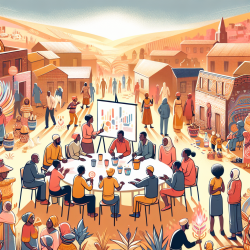The challenge of addressing men's use of violence against women (VAW) is a pressing issue globally, with significant implications for public health and social equity. In periurban South Africa, an innovative approach is being tested to mobilize communities and advocate for change in harmful gender norms. This blog explores the outcomes of a cluster randomized controlled trial (C-RCT) aimed at reducing VAW through community mobilization and advocacy, providing insights for practitioners seeking to improve their skills in this critical area.
The Sonke CHANGE Intervention
The Sonke CHANGE intervention is a community-based program designed to challenge and transform harmful gender norms. Implemented over 18 months in a periurban settlement near Johannesburg, South Africa, this intervention engages men aged 18-40 years through local advocacy and group activities. The goal is to foster equitable masculinities, reduce alcohol use, and ultimately decrease the perpetration of VAW.
Key Components of the Intervention
- Workshops: Interactive sessions that promote reflection on gender norms and encourage actions towards equality.
- Community Action Teams (CATs): Volunteer groups that mobilize community members through educational outreach and activities like door-to-door campaigns and street interventions.
- Advocacy: Efforts by Sonke staff to hold local authorities accountable for VAW prevention and engage with community structures.
Outcomes and Implications for Practitioners
The trial's primary outcome is the reduction in men's use of physical and/or sexual VAW. Secondary outcomes include changes in harmful alcohol use, gender attitudes, controlling behaviors, transactional sex, and social cohesion. The intervention's effectiveness is measured through self-reported data collected at baseline, 12 months, and 24 months.
Implementing Findings in Practice
Practitioners can leverage the findings from this study to enhance their skills in several ways:
- Adopt Multilevel Approaches: Integrate community mobilization with individual-level interventions to address VAW comprehensively.
- Focus on Gender Norms: Develop programs that challenge traditional masculinity norms and promote equitable relationships.
- Engage Communities Actively: Foster local ownership of interventions by involving community members as active participants in change efforts.
The Role of Further Research
This trial highlights the potential of community mobilization as a strategy for reducing VAW but also underscores the need for further research. Practitioners are encouraged to explore additional studies on gender-transformative interventions to refine their approaches and maximize impact.
The Sonke CHANGE trial contributes valuable evidence from a low-income setting, offering lessons that can be adapted to different contexts globally. By understanding the pathways to change identified in this study, practitioners can develop more effective strategies for preventing VAW.
Conclusion
The Sonke CHANGE intervention demonstrates that community mobilization can be a powerful tool in transforming harmful gender norms and reducing violence against women. Practitioners seeking to enhance their skills should consider integrating these strategies into their work while remaining open to new research that can inform best practices.
To read the original research paper, please follow this link: A cluster randomised controlled trial to determine the effect of community mobilisation and advocacy on men’s use of violence in periurban South Africa: study protocol.










